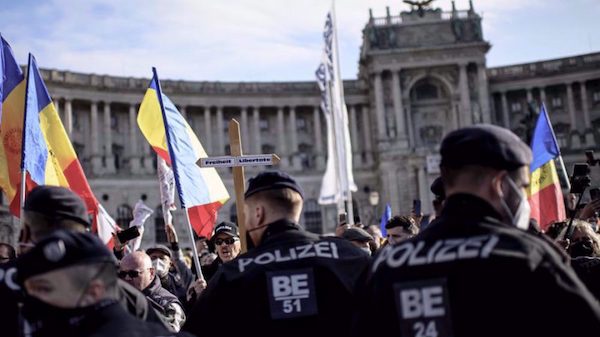
The photo shows people protesting in the streets of the Austrian capital Vienna against total national lockdown.
Thousands of people have poured onto the streets of the Austrian capital, Vienna, to protest against government plans to introduce mandatory COVID vaccinations for all next month, as the Omicron variant continues to surge rapidly across the European country.
The government must go! crowds chanted at a rally in central Vienna on Saturday, in what has become a routine event at weekends since Austria announced it would make vaccinations compulsory almost three months ago.
Parliament is scheduled to vote next week on the issue, which has polarized the country as coronavirus cases surge.
Austria imposed a national lockdown in November and made vaccinations mandatory from February 2022, following a surge in coronavirus cases, becoming the first EU country to take such stringent measures. Vaccination is to be obligatory for all those older than 14, except in the case of a dispensation for health reasons.
Nobody will be vaccinated by force, the government has said, but those who refuse the shot will have to pay an initial fine of 600 euros, which can then increase to 3,600 euros if not settled.
A poll for Profil magazine found 51% of those surveyed oppose making jabs mandatory from February, of whom 34% were against compulsory vaccination in general and 17% wanted to wait. The survey found 45% of Austrians favored compulsory vaccination starting in February.
The poll showed Chancellor Karl Nehammer’s conservatives and the opposition Social Democrats in a dead heat for first place at 25%, followed by the right-wing Freedom Party, a strident critic of government policy, at 20%. The Greens, junior partner in the coalition, were even with the liberal Neos on 11%, while the vaccine-skeptical MFG party scored 6%.
Health authorities have reported more than 1.4 million infections and nearly 14,000 deaths from COVID-19 since the pandemic broke out in early 2020.
First discovered in South Africa in November, the fast-spreading Omicron coronavirus variant is emerging in almost every corner of the world, even as more countries try to seal themselves off by imposing travel restrictions. The discovery of Omicron, dubbed a variant of concern by the World Health Organization (WHO), has sparked worries around the world that it could resist vaccinations and prolong the nearly two-year COVID-19 pandemic.
Omicron is potentially more contagious than previous variants, but experts do not know yet if it will cause more or less severe COVID-19 compared to other strains.
Much of Europe is already battling a surge in COVID-19 infections and some of them have reintroduced restrictions on social activity to try to stop the spread. That is happening even as many developed countries are giving third-dose boosters, while less than 7% of people in low-income countries have received their first COVID-19 shot.
Anti-vaccine protesters rally in Paris over new restrictions
Separately on Saturday, thousands of people took to the streets of the French capital, Paris, to protest against a new government plan to further restrict the unvaccinated.
Large crowds of angry protesters gathered near the Eiffel Tower, as they held banners and chanted slogans, slamming the policies of President Emmanuel Macron. There were further demonstrations in major cities across France against tighter restrictions on people not vaccinated, as well.
☑️ France 🇫🇷 Paris 1⃣/3
— Franky (@DarkiFranky) January 15, 2022
🔴 Massive protests EVERYWHERE in Europe against vax mandates & passports
Jan 15, 2022#NoVaccinePassports #NoGreenPass #France #Paris pic.twitter.com/v8kpUH2cES
Similar protests were also held in Italy and Switzerland.
On Saturday, a measure came into force that will deactivate the French government-issued health pass for tens of thousands of people who have not received a booster within seven months of their first course of shots in the first step. The pass - which grants access to public places like bars and restaurants - will be transformed into a vaccine pass under a law currently being debated in parliament, meaning proof of having the jab will be required.
So far people have been able to keep their pass valid with negative coronavirus tests.
French MPs in the National Assembly passed the vaccine pass bill to the Senate upper house in the early hours of Saturday. It is likely to be finally passed Sunday after back-and-forth between the two houses over questions like the minimum age for the pass and whether proprietors should be empowered to check customers’ identities.
The tougher measures have been pushed hard by the government as it faces a wave of infections with the faster-spreading Omicron variant. On Friday, 330,000 new COVID-19 cases were confirmed in France, with an average of almost 300,000 over the preceding week.
LINK: https://www.ansarpress.com/english/26148
TAGS:






























 Farkhunda Buried, Ghani Appoints Fact-Finding Team
Farkhunda Buried, Ghani Appoints Fact-Finding Team




